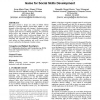81 search results - page 5 / 17 » Social Facilitation Effects of Virtual Humans |
HCI
2009
13 years 5 months ago
2009
Abstract. Social psychologists have documented that people attribute a humanlike agency to computers. Work in human motor cognition has identified a related effect known as "i...
ROMAN
2007
IEEE
14 years 1 months ago
2007
IEEE
—Endowing robots with a social interface is often costly and difficult. Virtual characters on the other hand are comparatively cheap and well equipped but suffer from other diffi...
APGV
2010
ACM
13 years 11 months ago
2010
ACM
Spatial awareness is crucial for human performance efficiency of any task that entails perception of space. Memory of spaces is an imperfect reflection of the cognitive activity (...
CSCW
2006
ACM
14 years 1 months ago
2006
ACM
This paper presents a design case study of SIDES: Shared Interfaces to Develop Effective Social Skills. SIDES is a tool designed to help adolescents with Asperger’s Syndrome pra...
VRST
2004
ACM
14 years 1 months ago
2004
ACM
Presence is one of the goals of many virtual reality systems. Historically, in the context of virtual reality, the concept of presence has been associated much with spatial percep...

